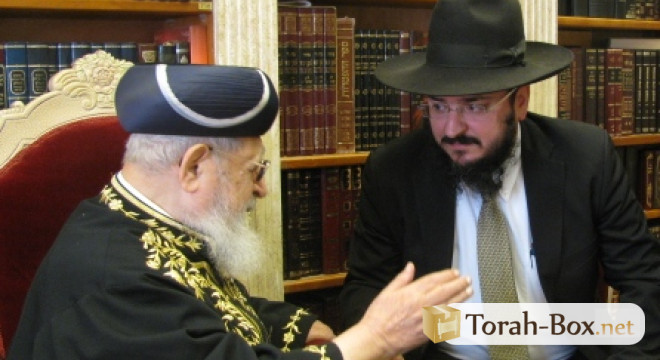
Torah World
Halacha: The Specificity of Rabbi Ovadia Yosef's Psak
Rav Ovadia Yosef was considered one of the greatest, if not the most prominent halachic decision-maker of the last 100 years. In his lifetime, the Rav wrote more than 40 books of responsa on Halacha, and his books are the bedrock of halachic discussion and " halachic decisions" applied throughout the Jewish world. Up until his last days, he was addressed as the determining factor in multiple rabbinical courts to decree some of the most delicate and troublesome halachic questions. At his funeral in Jerusalem, his children and particularly the newly appointed Rishon LeTzion, Yitzchak Yosef promised to perpetuate his teachings and his decision-making directives.
But What Was the Specificity of the "Psika" of Rav Ovadia Zatzal?
Before expanding on several key arguments on which the Rav relied to make halachic decisions, one must become familiar with the context that influenced his approach: Rav Ovadia had a mission to fulfill on behalf of the People of Israel. Indeed, the Rav was immensely zealous in Torah study. He studied every day until 2-3 am, sleeping only 4 hours a night. Every free moment was spent studying; he only stopped to care for the beloved people of Israel.
He felt the People ought to be encouraged to scrupulously respect the Halacha, without imposing stringent decrees which the public could not abide by. The Rav was empathetic to the pain and difficulties of his fellow Jews, and particularly to the predicament of the many "Agunot" (married women denied a get by absent husbands) which he helped throughout his lifetime.
His mission was not only about Halacha and Halachic decrees, but also about the Judaism of the People. He accepted invitations to Torah classes and took advantage of these opportunities to encourage everyone to increase Torah study and observe the Mitzvot. The Rav who was the spiritual leader of a powerful political party and who exerted a profound influence on Israeli politics had only one interest in mind: to influence spreading Judaism in Israel and to build religious schools throughout the country so Jewish education would be available to everyone. He also aspired to build synagogues, mikvaot, and yeshivot. Aware of the importance of his mission, the Rav relied on three halachic principles to make a halachic decision:
First Principle: '' Koach Dehetera Adif ''
The Rav relied on a principle that the Gemara calls "koach dehetera adif" (the lenient opinion is preferable). He applied the Torah's preference to seek arguments in favor and avoid reasons to forbid. Therefore the "psika" of the Rav is compared to that of Beth Hillel; both made Halachic decisions in favor of leniency wherever possible.
Second Principle: “Kibalnu Daat Maran”
Rabbi Yosef Karo, the author of the Shulchan Aruch and Beth Yosef, was widely recognized by the communities of his time as the chief Rabbi and halachic decision maker of Eretz Israel. The status of Rabbi Yosef Karo is considered as that of the Mara Deatra (the master of the place). The Halacha binds one to follow his opinion, although the latter has been widely discussed and challenged by other decision makers. Since the publication of the Shulchan Aruch, many other opinions have been written and over time, many halachot have deviated from the original Shulchan Aruch. Rav Ovadia Yosef defended the stance of the Shulchan Aruch while arguing and answering opposing poskim's questions on its laws. He advocated reinstating adherence to the Shulchan Aruch, together with some restrictive rules based on the opinion of the Shulchan Aruch, which had been recognized since the time of its writing.
In addition, Rav Ovadia highlighted the opinion of Sephardic poskim, because all printed editions of the Shulchan Aruch came from Ashkenazi countries. Most if not all commentators were unfamiliar with Sephardic opinions and customs, which compelled the Rav to modify many halachot based on the Ashkenazi poskim, which were not fully compliant with the Shulchan Aruch, nor the Sephardic poskim.
Third Principle: Decision-Making Based on the Majority
When the Beth-Din (rabbinical court) comes across several diverging opinions to resolve a legal case, the Torah recommends us to adhere to the majority's opinion. With his phenomenal knowledge of poskim, the Rav considered all the opinions and trends which transpired over the years. He made his decrees, according to the opinion of the majority, particularly in cases where he had reached a similar conclusion through personal study. This peculiarity was unique to him. In the last 100 years or more, there had not been a Rabbi of comparably vast and expanded knowledge on the books of the Rishonim, the Aharonim and the Poskim.
- « Getting Married During the Omer: An Extraordinary Psak Din
- Shidduch - Rav Steinman and Rav Kanievsky Shared the Same... »
Torah-Box.net Account
To access the entire Torah-Box.net website, sign up for free in less than a minute.
Weekly Parsha
 Candle Lighting - New York
Candle Lighting - New York
Friday January 2nd, 2026 at 16:22 *Shabbat ends at 17:27 *
change my location
* Times given as an indication, check the times of your community











